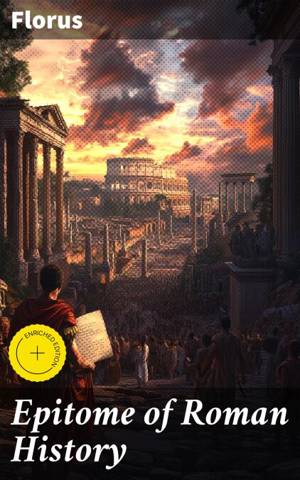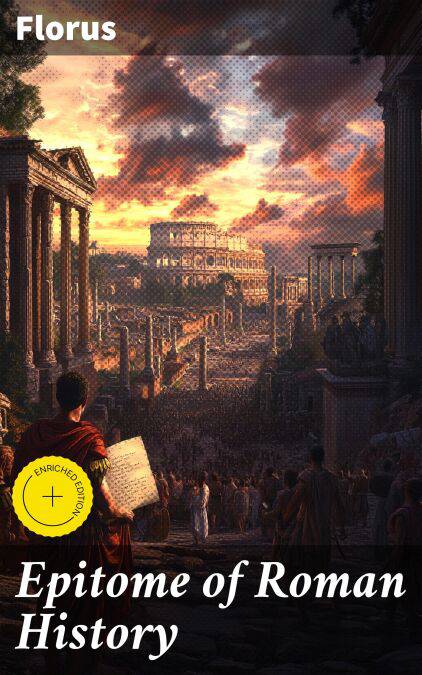
- Afhalen na 1 uur in een winkel met voorraad
- Gratis thuislevering in België vanaf € 30
- Ruim aanbod met 7 miljoen producten
- Afhalen na 1 uur in een winkel met voorraad
- Gratis thuislevering in België vanaf € 30
- Ruim aanbod met 7 miljoen producten
Zoeken
Epitome of Roman History E-BOOK
Enriched edition. A Concise Overview of Ancient Rome's Key Events and Rulers
Florus
E-book | Engels
€ 1,99
+ 1 punten
Omschrijving
In his seminal work, "Epitome of Roman History," Florus presents a comprehensive yet concise overview of Rome's illustrious past, chronicling its rise from humble beginnings to the pinnacle of power in the ancient world. Written in a clear and engaging style, the text is structured as a historical narrative that is rich in rhetorical flair, embodying the characteristics of early Roman historiography. Florus deftly synthesizes various historical sources, emphasizing key events and figures while offering a sharp commentary on themes such as virtus (virtue) and fortuna (fortune) that were central to Roman identity, thus providing readers with an insightful lens through which to understand the complexities of Rome's legacy amid the broader tapestry of classical literature. Florus, a Roman historian of the first century AD, was deeply influenced by the political and social upheaval of his time, including the transition from the Republic to imperial rule. His scholarship reflects a desire to distill Rome's vast history into an accessible format, catering to both scholars and a broader audience. His positioning as a senator and his experiences likely informed his perspective, leading him to emphasize the moral lessons derived from Roman history. I highly recommend "Epitome of Roman History" to readers seeking a foundational understanding of Roman history with a narrative flair. The work serves not only as an historical chronicle but also as a reflection on the moral and philosophical implications of Rome's past, making it a must-read for students of history and lovers of classic literature alike.
In this enriched edition, we have carefully created added value for your reading experience:
- A succinct Introduction situates the work's timeless appeal and themes.
- The Synopsis outlines the central plot, highlighting key developments without spoiling critical twists.
- A detailed Historical Context immerses you in the era's events and influences that shaped the writing.
- An Author Biography reveals milestones in the author's life, illuminating the personal insights behind the text.
- A thorough Analysis dissects symbols, motifs, and character arcs to unearth underlying meanings.
- Reflection questions prompt you to engage personally with the work's messages, connecting them to modern life.
- Hand‐picked Memorable Quotes shine a spotlight on moments of literary brilliance.
- Interactive footnotes clarify unusual references, historical allusions, and archaic phrases for an effortless, more informed read.
In this enriched edition, we have carefully created added value for your reading experience:
- A succinct Introduction situates the work's timeless appeal and themes.
- The Synopsis outlines the central plot, highlighting key developments without spoiling critical twists.
- A detailed Historical Context immerses you in the era's events and influences that shaped the writing.
- An Author Biography reveals milestones in the author's life, illuminating the personal insights behind the text.
- A thorough Analysis dissects symbols, motifs, and character arcs to unearth underlying meanings.
- Reflection questions prompt you to engage personally with the work's messages, connecting them to modern life.
- Hand‐picked Memorable Quotes shine a spotlight on moments of literary brilliance.
- Interactive footnotes clarify unusual references, historical allusions, and archaic phrases for an effortless, more informed read.
Specificaties
Betrokkenen
- Auteur(s):
- Vertaler(s):
- Uitgeverij:
Inhoud
- Aantal bladzijden:
- 142
- Taal:
- Engels
Eigenschappen
- Productcode (EAN):
- 4064066465391
- Verschijningsdatum:
- 9/04/2021
- Uitvoering:
- E-book
- Beveiligd met:
- Digital watermarking
- Formaat:
- ePub

Alleen bij Standaard Boekhandel
+ 1 punten op je klantenkaart van Standaard Boekhandel
Beoordelingen
We publiceren alleen reviews die voldoen aan de voorwaarden voor reviews. Bekijk onze voorwaarden voor reviews.








